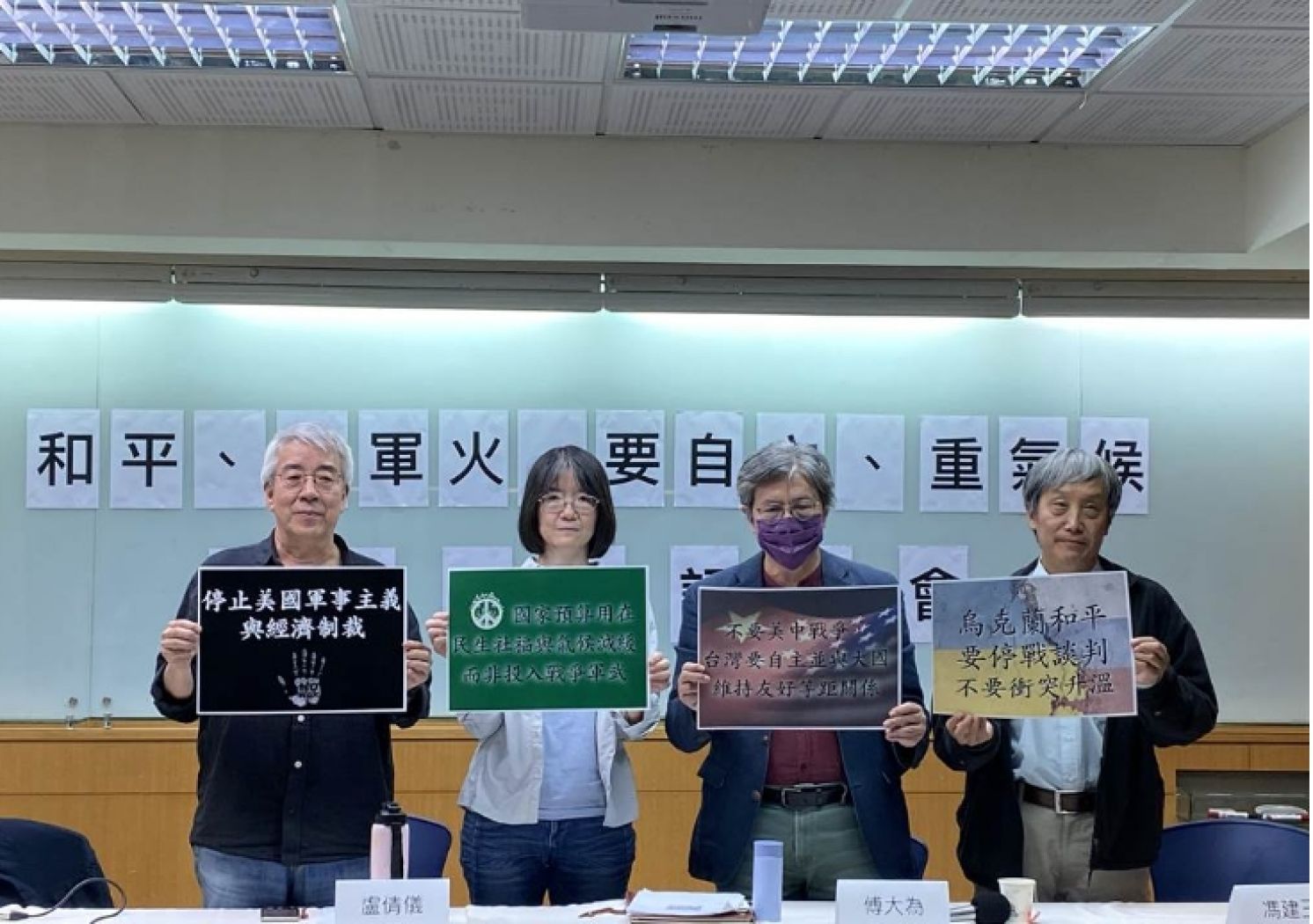
"Anti-War" Statement by Four Scholars Lambasted by DPP Supporters:Undermining of Free Speech?
United Daily News, March 17, 2023
Recently, four scholars, including professors Feng Chien-san and Kuo Li-hsin from National Chengchi University; professor Fu Ta-wei from National Yang Ming Chiao Tung University; and research fellow Lu Chien-yi from Academia Sinica, issued an "anti-war" statement advocating "peace, anti-arms trade, environmental protection, and autonomy," which was later harshly attacked by supporters and lawmakers of the ruling Democratic Progressive Party (DPP). The scholars were criticized for merely calling for an end to U.S. militarism and economic sanctions without mentioning Russia's aggression or China's intimidation toward Taiwan. Since then, the academic community has expressed its support for the scholars, stating that prohibiting the expression of dissenting opinions—suspicion of the United States—undermines freedom of speech.
The four scholars issued a four-point call to prevent Taiwan from becoming a battlefield: First, on peace in Ukraine, stop military conflict and start negotiations. Second, stop U.S. militarism and economic sanctions. Third, instead of military spending, focus the national budget on people's livelihood, social welfare, and climate change mitigation. And fourth, avoid a war between the United States and China, and Taiwan should keep its autonomy while maintaining friendly relations with all major powers.
This statement emphasized that the United States and China must resolve all their differences peacefully, and this beautiful land of Taiwan should not be used as a battlefield. We do not welcome any visits from high-level foreign officials who may sacrifice Taiwan's security and push it to the brink of war, nor do we support military cooperation that could be clearly interpreted as provocative behavior. The scholars advocated that Taiwan should maintain its security through wise strategies and approaches, rather than becoming a pawn or follower of the U.S. hegemony or a counterweight to the "Chinese wolf warrior" in the face of China's aggression.
They condemned any deliberate provocations that could lead to conflicts, believing that the benefits of peace achieved by ending provocations far outweigh those achieved through military forces, military presence, or threats of war. Instead of ignoring China's various suppression and military threats against Taiwan, they hoped that through people's collective wisdom Taiwan would find a more peaceful path to cope with the U.S.-China rivalry. They also anticipated that this statement would spark more rational public discussions and dialogues on international politics as well as the cross-strait crisis in Taiwan's civil society.
After this anti-war statement came to light, however, the scholars were met with a lot of accusations and ridicule. DPP lawmakers Chao Tien-lin and Fan Yun, for example, refuted by saying that the four should have issued an "anti-aggression statement" instead.
Recently, independent Legislator Kao Chin Su-mei questioned Premier Chen Chien-jen in the Legislative Yuan about the U.S. State Department's "Taiwan Fellowship Program," to which Chen responded angrily, saying "Don't doubt the American will defend Taiwan. No one will believe you." In February, Vice President and DPP Chairman William Lai also mentioned that people shouldn’t let skepticism towards the United States become a social consensus, or else it would be extremely detrimental to Taiwan.
Chou Yang-shan, a former Control Yuan member and professor at Chinese Culture University, stated that if the Russo-Ukrainian war ends, the United States is more likely to provoke a conflict in the Taiwan Strait. Anti-war statements can reflect the mainstream voice in Taiwan at the moment. While Taiwan is not the aggressor, it can choose not to dance with the United States to provoke mainland China. Taiwan can also choose to expand its autonomy, stop acting as an American proxy, take the lead in cross-strait reconciliation, and avoid triggering a war crisis in the Taiwan Strait. All these are under Taiwan’s control.
Academician Ovid Tseng of the Academia Sinica stated that the government's administrative system forbidding scholars from raising doubt about the intention of the United States is exactly an act of undermining freedom of speech.
Main Theme of Taiwan’s 2024 Elections Will be “Anti-War” and “Reconciliation”
Chou Yang-shan said the fact that some DPP members oppose signing the "anti-war statement" shows that the DPP’s doctrine of "resist China to protect Taiwan” still prevails.
Why did the DPP political flank and DPP lawmakers jointly attack and criticize the scholars’ the anti-war statement, and even labeled them as pro-Communist? Chou believes that some DPP members still want to play the American proxy role. However, the main theme of next year's general election will certainly be "anti-war" and "reconciliation." The opposition Kuomintang (KMT) will surely take this approach, and the DPP will also be forced to follow suit. Judging from the local elections last year, voters clearly told the DPP that they did not want to go to war, and if the DPP continues to pursue a war-like route, they would not follow. Therefore, the "anti-war statement" is actually in line with the mainstream voice in Taiwan at this stage.
If Ukraine fails to take back its lost territory, then skepticism about Taiwan’s reliance on the United States may increase.
Chou stated that the occurrence of "doubting America" is caused by the people's realization that their own lives and properties are involved. "Doubting America" does not equal “anti-American,” but rather some kind of skepticism that once a war breaks out in the Taiwan Strait, the U.S. will not send their troops there. If the Russia-Ukraine War ends through negotiations, and Ukraine does not regain any lost territory, Taiwan’s sentiment of skepticism towards the United States will only become stronger.